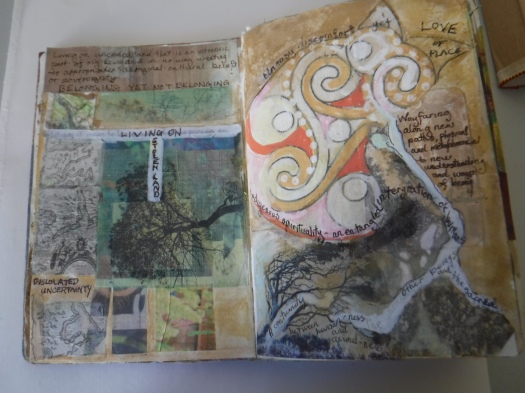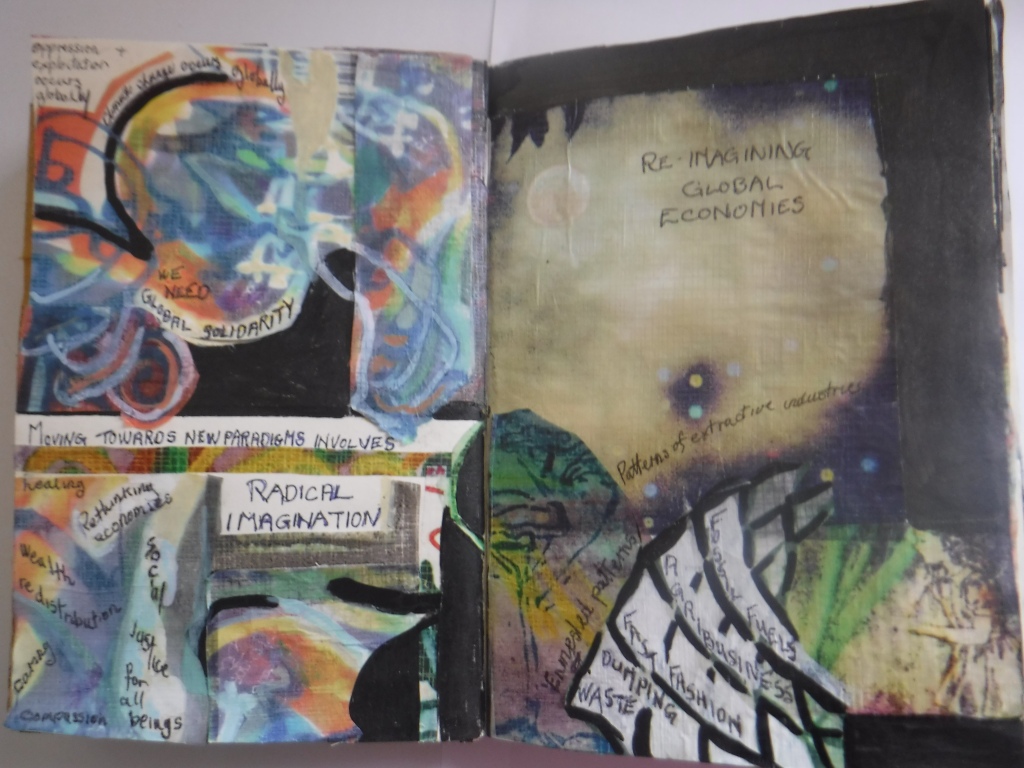The environmental results of ecological damage are not restricted by geography. Wild weather caused by climate change is not limited by national boundaries. It is indiscriminate and global.
The same can be said for the oppression of people at society’s margins. Increasingly the economic repercussions are felt by poorer people in rich countries as well as those in global south. My heart goes out to indigenous people displaced from their traditional homelands to make way for cattle farming or lithium mining to make batteries for electric cars. Their plight is tragic. At the same time the number of families sleeping in tents and people unable to buy enough food is on the increase here in Australia. As an older white woman experiencing housing insecurity I speak from firsthand experience. Apparently too, other countries in the developed world are experiencing similar economic conditions.
The current political and economic conditions are divisive and marginalize those on the edges of society – indigenous communities, the disabled, the aging and those with mental health issues struggle to make their voices heard over the rush and roar of the post-pandemic ‘getting back to normal’ frenzy and paranoia.
Underneath more recent economic impacts the long term and historical impacts of colonial capitalism fester as an unhealed wound in many parts of the world. Recognition of the injustices wrought by colonization is a fraught issue that haunts the present.
This can be seen in Australia where we are being asked to vote on whether Aboriginal people should have a legally constituted voice to parliament to give advice on issues that impact their communities. Voting occurs on October 14. In the build up vitriolic, and sometimes racist, opinions are getting a lot of media attention. Misinformation is rife and wild speculations about property ownership highlight the underlying unease of many Australians living on unceded Aboriginal land. Somehow we have to find our way to a peaceful solution that gives all Australians a say in how we live upon this ancient land that works its way into the soul of most who live upon it. At times such equitable co-existence seems a long way off.

The political machinations of these times go hand in hand with the economic hardships many are experiencing and with the impact of environmental disasters wrought by climate change – the extreme bushfires, the floods that alienate whole towns, the droughts that go for decades etc.
Meanwhile the fossil fuel and other extractive industries continue to pollute, exploit, degrade environments and dump waste. These activities are aided by government subsidies and neo-liberal policies that actively suppress opposition.

Once again, I come up against the impasse of the Anthropocene. Whichever way I approach the problem, I come to the realization that the only way forward is through changing and transforming way we live on Earth.
As much as we need to deconstruct the thinking that sees humans as separate from nature, we need to overhaul the political and economic frameworks that support extractive capitalism.
There are many different economic that provide for more equitable social conditions. These include doughnut economics, ecological economics and decolonial economics. Alternatives to capitalism in the 21st century include decolonial and eco-feminist social practices and the concept of direct democracy.
One thing all these ideas have in common is that they require a radical re-imagining of how we think and live. As a creative person communicating with other creatives I see there are opportunities for us here. We can contribute to the dialogue that leads us forward through our writings, poetry, art and other creative endeavours. I will look at this idea next.

I’m convinced many of us are going to have to be content with a less energy-intensive way of life. That is unthinkable to many, who believe they have the right to “unlimited” good things. People with less, whose experiences are limited, are seen as “losers.” It will take a lot of change for those of us in wealthy countries to voluntarily adopt a leaner lifestyle. Of course, it may happen anyway as a result of climate catastrophes.
LikeLiked by 1 person
Yes, it does seem impossible to imagine people choosing to live more frugally. Over here it is a long weekend and the first warm time since last autumn. All weekend the roads have been packed with sports cars, caravans, boats, and mobile homes! The difference between rich and poor in this country is getting wider every day.
LikeLiked by 1 person
Canada is definitely feeling the distress of housing and food insecurity for homeless, low income and even middle class families now. Specualtors have driven rents up to more than peoples’ incomes and government let that happen. Corporations price gouge and government wags a finger – but they still dont get taxed proportionately to profit, the way taxpayers do. Two income families are using foodbanks now. Funny how it is only when the middle class complains that government pays attention, never when poor people struggle. Imagine those of us living below the poverty level. Iam aghast that there even has to be a referendum on whether Aboriginal people should have a say in their own lives. Oh my goodness! In Canada, because of the Truth and Reconciliation movement, First Nations voices are growing louder and more powerful, a resurgence I am so heartened to see. We basically need government to stop subsidizing corporations that destroy the planet and require them to pay their share of taxes and clean up their own messes. Likely will never happen. We need to decolonize everything – and loosen the death grip corporations have on the planet. How to do that when government isbasically elected through corporate support? Therein lies the problem. You are doing such good work in this series, kiddo. Write on.
LikeLike
The Australian Voice to Parliament referendum is an event that had to happen. I hope the country votes Yes.
Looking at the Anthropocene through a political lens is doing my head in. Don’t know where I’ll go to next in this series. Hopefully to the last one!
LikeLike
Our politicians not only ignore native communities and their rights, but they are seeking to portray slavery as a good thing. All to justify their “right” to power. It can’t last, but there needs to be alternatives waiting in the wings, something positive to work for and with. You are right that we need to keep talking about, and exploring, new and different ways to be. (K)
LikeLike
Gosh. Portraying slavery as a good thing is mind blowing. Yes there has to be alternatives, I totally agree.
LikeLiked by 1 person
Florida wrote it into their education curriculum. They don’t want white children to feel bad or some such nonsense. In the meantime they are being ravaged by one storm after another, and still deny climate change as well…
LikeLike
I’m lost for words! I had no idea things had got to that level. How appalling.
LikeLiked by 1 person
Indeed. There is no end to Trump’s bad influence.
LikeLiked by 1 person